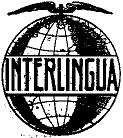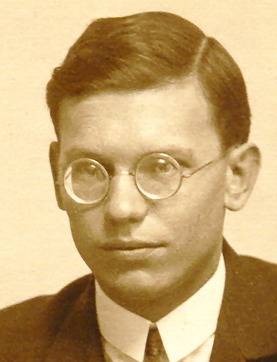
Interlingua is an international auxiliary language (IAL) developed between 1937 and 1951 by the American International Auxiliary Language Association (IALA). It is a constructed language of the "naturalistic" variety, whose vocabulary, grammar, and other characteristics are derived from natural languages. Interlingua literature maintains that (written) Interlingua is comprehensible to the hundreds of millions of people who speak Romance languages, though it is actively spoken by only a few hundred.

Latino sine flexione, Interlingua de Academia pro Interlingua or Peano's Interlingua is an international auxiliary language compiled by the Academia pro Interlingua under the chairmanship of the Italian mathematician Giuseppe Peano (1858–1932) from 1887 until 1914. It is a simplified version of Latin, and retains its vocabulary. Interlingua-IL was published in the journal Revue de Mathématiques in an article of 1903 entitled De Latino Sine Flexione, Lingua Auxiliare Internationale, which explained the reason for its creation. The article argued that other auxiliary languages were unnecessary, since Latin was already established as the world's international language. The article was written in classical Latin, but it gradually dropped its inflections until there were none.
The Union Mundial pro Interlingua is a global organization that promotes Interlingua, an international auxiliary language (IAL) published in 1951 by the International Auxiliary Language Association (IALA). UMI was founded on July 28, 1955, when the first International Interlingua Congress took place in Tours, France. The UMI collaborates with the national Interlingua organizations and has a hand in publishing dictionaries, grammars and tutorials. It is a non-profit organization that now operates out of Bilthoven, Netherlands.
Kontoret för särskild inhämtning (KSI), "The Office for Special Acquisition", is part of the Swedish Military Intelligence and Security Service (MUST) and also one of the most secret parts of the Swedish Armed Forces. The previous names until 1994 were: T-kontoret (1946–1964), IB (1965–1973), Gemensamma byrån för underrättelser (GBU) (1973–1982) and Sektionen för särskild inhämtning (SSI) (1982–1994).

Israeli Diving Federation (TIDF) is a non-governmental SCUBA diving training organization based in Israel.
Jeanne Martinet was a French semiotician and a proprietor of a semiotics school. Her husband was the eminent linguist André Martinet (1908–1999). In 1973, in Paris, Martinet published the book Clefs pour la sémiologie, which has been translated into numerous languages. In 1993, she co-authored, with her husband, the volume Mémoires d'un linguiste.
The Brazilian Union for Interlingua is the national Interlingua organization in Brazil. The UBI, founded at the first Brazilian Interlingua Conference in 1990, teaches and promotes Interlingua in South American countries. The UBI arranges annual conferences in Brazil and maintains representation in some Brazilian states.
Július Tomin was a Slovak high school teacher and author. He was persecuted during the Soviet occupation for promoting Interlingua as a second language.
The Union Danese pro Interlingua, the oldest of the Nordic Interlingua organizations, was established on November 7, 1960 – four years before the Swedish Society for Interlingua. The DIU promotes and provides for the teaching of Interlingua in Denmark and in Nordic countries such as Iceland, which do not yet have official Interlingua representation. It maintains a publishing program and, in collaboration with the Swedish, Norwegian, and Finnish Interlingua organizations, has produced the magazine Actualitates – Interlingua i Norden since 1960.
The British Interlingua Society, established in 1956, works in Great Britain and the English-speaking world to promote the knowledge and active use of Interlingua, the international language. Among the publications of the BIS is the transatlantic magazine "Lingua e Vita", with articles in English and Interlingua. It has appeared since 1965, and previously as the "Littera Circular" or Circular Letter. A second BIS publication is "Contacto". Founded in 1994, this magazine provides articles and regular features about Interlingua and the organization. Contacto is written in English and in parallel Interlingua-English texts.
Willem Jacob Visser worked to unite the organizations of different auxiliary languages. In the 1970s, he edited a magazine Union in Eurolatin, his own variation of Interlingua. In the pages of Union, he published articles and excerpts from users of all auxiliary languages and their periodicals. Visser argued that "interlinguists throughout the world should become friends", and his magazine is credited with improving understanding. He was Ido Representative in the Netherlands and later a member of Interlingua-Nederland.

Engelbert Pigal was an Austrian engineer. A speaker of Interlingua and two other auxiliary languages, he wrote two cosmological monographs in Interlingua.
Wilhelm Bladin was a noted progressive teacher and author born in Gävle, Sweden. He compiled grammars, manuals, and dictionaries in English, German, French, and Interlingua. He was the second Secretary General of the Union Mundial pro Interlingua for Sweden.
Lingua e Vita is the official magazine of the British Interlingua Society (BIS). Founded in 1965 as an initiative of Brian C. Sexton, Lingua e Vita is a continuation of the earlier organ of the BIS, the Circular Letter.
The Circular Letter was an early Interlingua newsletter published from 1954 to 1965, when it was expanded and renamed Lingua e Vita. D. M. Hallowes, who became the Secretary of the British Interlingua Society (BIS), edited the publication. Issue 9, dated March 1956, printed a suggestion that a British Interlingua organization be formed:
"Mr. (N.) Divall has suggested the time has now come when the friends of Interlingua in the British Isles are numerous enough that they should form a society similar to those possessed by the movements for Interlingue (Occidental) and Ido...This announcement can be regarded as sufficient to create it."

A pan-Romance language or Romance interlanguage is a codified linguistic variety which synthesizes the variation of the Romance languages and is representative of these as a whole. It can be seen as a standard language proposal for the whole language family but is generally considered a zonal constructed language because it's the result of intense codification. Zonal languages are, according to interlinguist Detlev Blanke, constructed languages which "arise by choosing or mixing linguistic elements in a language group".
Interlingue and Interlingua are constructed international auxiliary languages.




